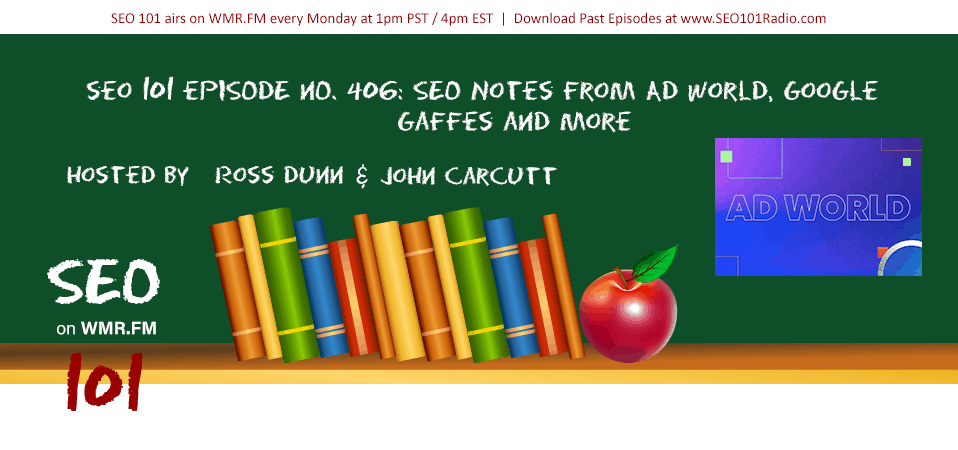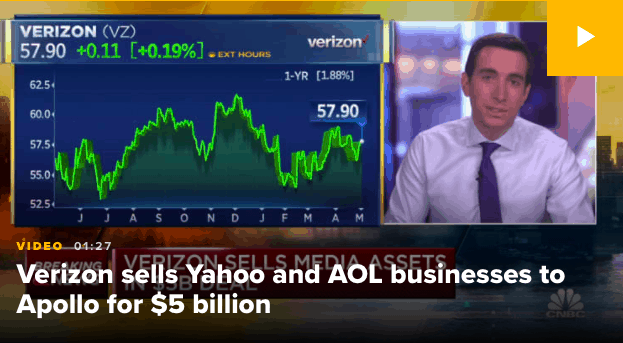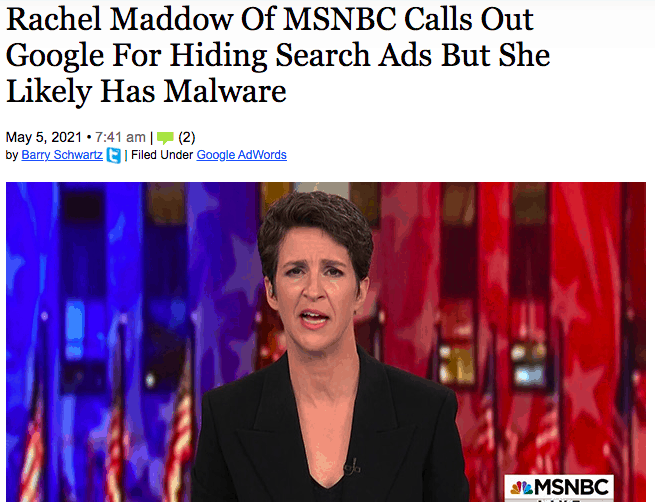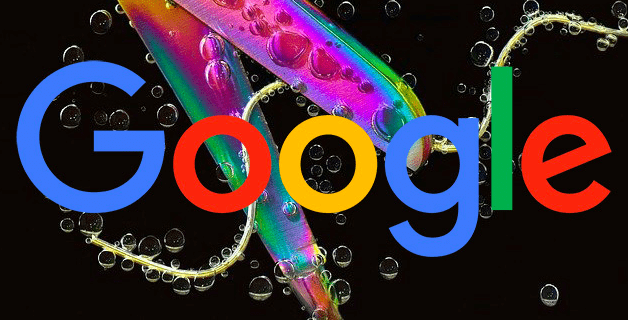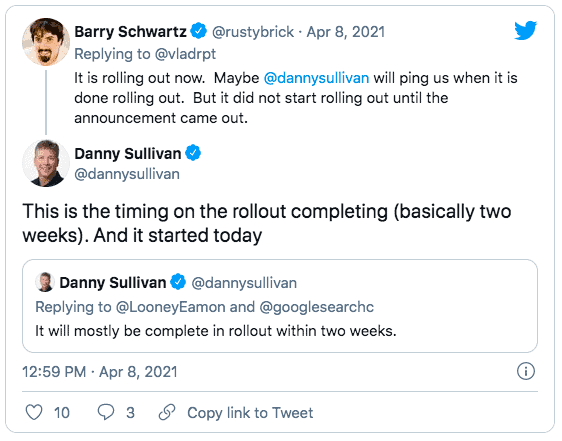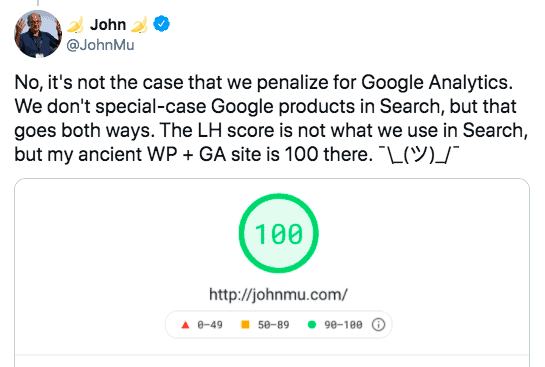The hosts discuss Yahoo’s fall from grace amidst its Verizon sell-off, Rachel Maddow’s goof, Google’s featured snippet gaffe, a Google algorithm update that affects review sites, and Mueller files.
Noteworthy links from this episode:
- CNBC article – Verizon Sells Media Businesses
- MSNBC Calls Out Google For Hiding Search Ads
- SEO Roundtable – Google Adds Links To Featured Snippets Leading Back To Google Search Results
- Google’s Product Review Update – Article 1 and Article 2
- Google: We Do Not Penalize Sites For Using Google Analytics
- Google: Rel External, Noopener & Noreferrer Do Not Impact Your SEO
Transcription of Episode 406
Ross: Hello and welcome to SEO 101 on webmasterradio.fm episode number 406. This is Ross Dunn, CEO of StepForth Web Marketing. My stand-in co-host is my company’s senior SEO, Scott Van Achte.
How is your Ad World experience going? Good old Scott here has been in a conference for the last few days.
Scott: It’s been going well. It can be a little overwhelming, even though a lot of the topics are not foreign to me. A lot of it’s kind of refresher stuff and nothing absurd. When you’re getting a bit of an information overload—one presentation after another for three days, it’s a lot to take in.
Ross: It is. At least we’re not traveling to go to it. There’s something about that. By the end of the day, I’m just floored. I mean, it’s just deadly.
Scott: Oh, yeah. In-person it would be beyond exhausting, absolutely. Of course, in-person you get all the fun perks of going to a conference as well. It’s pros and cons I suppose. For me, with the Ad World Conference, you can of course watch the presentations after the fact. Everything’s recorded, of course. I’ve been doing it live and getting up extra early. That in itself has been weird just because I’m up and watching this conference while the rest of my family is upstairs sleeping.
That’s okay too. I figured, if I waited a couple of days I thought I’d fit them in as I go, I’d probably not watch nearly as much.
Ross: I’ve got the core staff doing this. Part of the reason for it, I was hoping that we’d get some exposure to some new techniques, new ideas, just spark some concepts in-house, something that I think every business should do once in a while. I’m not sure I would do Ad World again. We’d have to see. I’ll get a poll of everyone afterward and how it went.
I’ve seen a couple that was more advertorial than actual content, so I was a little disgruntled by that. There is some good stuff too. I know that. We’ll see. Anyways, I hope some other people are out there experiencing the Ad World episodes I want to call it, but they’re not. They’re streams.
Scott: I keep calling them webinars, but they’re not that either. Presentations, I guess.
Ross: We’re fairly high level, so it’s pretty difficult to get new stuff. The people who are—or at least in areas we want to learn. A lot of smaller businesses would find it helpful.
Scott: I would say, yeah. Their target is probably the small business owner or even a new SEO—someone who’s just starting out. There’s probably a lot more to learn there. I found a lot of the coverage was about things like video advertising and things like that. We don’t do video production. I was focused on producing actual video ads. A lot of that still translates into copy and other things that we do. There’s still stuff you can pick up if you pay attention. It’s definitely not geared towards seasoned SEOs.
Ross: No. Well, we’ll see. Is it over already? It is finished, isn’t it?
Scott: The last one, I think, stopped about a half-hour ago.
Ross: All right. There you go. Well, let’s jump into, first, a little non-SEO news. You put these down here, so soon we’ll have some kind of connection.
Scott: Well, there’s a bit of a connection. Verizon, for instance, just announced that they’ve sold their media group to this private equity firm, Apollo Global, for $5 billion. Of that media group includes Yahoo, I thought that was kind of interesting because they bought Yahoo for $4.5 billion in 2017 and they bought AOL for $4.4 billion a few years before that. They’re selling those and that bunch of other things like TechCrunch, Engadget, other properties, and AOL for $5 billion.
Unless they’ve made a bunch of profit in the past four years, they’re definitely losing a little bit of money there. I found that interesting because none of the previous sales of Yahoo have really brought Yahoo back to life. I’m super curious to see what Apollo Global has planned for Yahoo They must have something. It may not be worth what it used to be, which actually there’s another point. I looked it up because I was curious.
Ross: This is fascinating.
Scott: I had no idea because this is before my SEO days. I wasn’t even in college yet at this point. I was probably still living at home with my dad. I don’t even know. On January 3rd, 2000, Yahoo stock hit an all-time high at $475,000, which made it the most valuable company in the world. I had no idea Yahoo! was at the top of the top for a while there.
Ross: How far it fell.
Scott: I don’t even know what Yahoo stock is now. A dollar? I don’t even know. Considerably less considering they’re bundled in with this $5 billion purchase.
Ross: What a shame.
Scott: When even Microsoft offered, I think it was close to $50 billion for Yahoo! 10 years ago. I bet they’re happy that didn’t work, although maybe they would have turned it around, who knows.
Ross: Property I’m sure.
Scott: Yeah. There’s value there but…
Ross: I love this next gaff, this is too funny. I’ll just mention it anyway. I got the gist of it. I didn’t see it happen. Rachel Maddow of MSNBC called out Google for hiding search ads. But she likely has malware on her computer. I think that’s so funny.
Rachel Maddow says and quoting her, “This belligerent new thing where search results jump down the page to make room for un-labeled ads, and then when you click a result, Google instead opens a new tab with an ad you weren’t trying to click…”
Danny Sullivan replied saying, “We don’t have “unlabeled” ads. Any ad in our Search results is labeled. Happy to see an example of what you’re concerned about here to pass on to the team.” He also added, “None of this matches with how we serve ads. They’re labeled. They don’t jump into results after the results have been generated. The new tab stuff sounds odd.”
Yeah, that sounds odd all right. There are some pretty nasty malware intrusions out there that can totally mess with your Google search results.
Scott: I don’t blame her for having the malware. Although, you would think she’s high enough level that she’d have the appropriate software to stop that. But to tweet about it and basically attack Google, it’s hilarious. That’s just funny.
Ross: You got to do a little homework first before doing this, especially a journalist.
Scott: You think a new tab opening up and everything, I don’t know. Maybe it’s just because we’re in this space all the time, but it seems super obvious to me that something fishy is going on.
Ross: Funny, I was doing a search today for a time tracking system and I saw this review. I wanted to click on it and I did click on it. Then I got blocked by I think it was Kaspersky, I’m not sure, telling me, we’re blocking this because it’s going to force you to download something immediately. All of a sudden I got all these alerts saying, block download, block download. This thing was in the top three in Google. They should have a little drop-down.
I think they tried this at one point where instead of just seeing the cached version, it also said report site. They should have something because that should not be in the top rankings because if someone doesn’t have the proper protection, they could be Maddowed.
Scott: That’s going to be a lot of people too. I want to share just a couple of tiny examples that are kind of similar on my part, except I didn’t tweet about it yelling at Google or a web host. You just touch on that as well with Kaspersky catching it.
I have a time like that as well where everything was weird on my computer and it took me a while—not a super long time, maybe a day to figure it out. I have Kaspersky set to block ads, which normally I don’t do because we look at ads as part of our job. I kind of need to see them.
I wasn’t seeing ads and everything was different. It took me a while to realize that, oh, that’s just a stupid thing on my side, that Kaspersky was blocking everything. If things look weird, there’s a good chance it’s on your end.
We had something else similar happen with a client a couple of years back where I was making changes for her on her site. She was getting back to me saying, why aren’t these changes live? She wasn’t too happy about it, like, well, they are alive. I could see it and everyone in the world could see it, but she couldn’t. She had other co-workers in their office check and it was the same. She checked on her phone and it was the same. They just could not see the changes.
Finally, I was talking to Denis, actually, our programmer. He suggested that she try using her cellular data rather than her Wi-Fi on her cell phone. She did that and suddenly she could see the changes. It all turned out ultimately to be a caching issue on their internal network in their office. Every computer connected to their Wi-Fi was showing one version of their website and everyone else in the world saw something else.
I guess it’s just an example. It kind of applies with Rachel Maddow in that it could be on your end. Before you go after somebody at this witch hunt, make sure it’s not your own fault.
Ross: Yeah, and it brings up a good point. When you’re doing testing of your website, you’re testing ranking results, all these things—use incognito on your search, whatever browser you’re using, whatever version of incognito it is. I’m speaking of Chrome, but I know they have them on the other ones (private browsing or whatever). It tends to force the cache to reload. You’ll see or won’t even use the cache that’s in the system. It’ll just take what’s online.
Typically, that can show you something has been updated when your own cache isn’t. It’s a very useful little trick. People say just refresh the page. That doesn’t actually work necessarily. There’s another way you can press shift—this is PC anyway. Press shift and then click refresh and that forces a refresh of the cache. Of all those tested, I find the incognito the best.
Scott: Even with that in mind, sometimes you have to take it a step further and go to your web post. WP Engine, for instance, will have a separate cache altogether that you’ve got to flush. If you don’t know how to do that, it’ll still update itself anyways. You might be waiting a day if you don’t know to do that. We’ve definitely had our fair share of that sort of thing happen too.
Ross: If you go into WordPress and you’re back into the WordPress site, you’ve made changes, sometimes you’ll see an alert and it becomes kind of like banner blindness. You haven’t really paid attention anymore. It’ll say, something has changed, you may want to refresh the cache. That’s important. Flush it and then all of a sudden you’ll see some changes online based on what you were doing if you hadn’t seen them before.
Anyway, it is very SEO-related. I’m glad you brought it up. Now, into some SEO news. This is quite a little debacle. I was pretty surprised by this initially.
When you see featured snippets within search results, those are typically snippets of content that are taken from a website. Google determines a very good results source for your search. They’re literally taking content from that person’s page, they put it up there, and then they give a link to the site.
Well, this example someone had found showed that Google did that just fine. Some people don’t feel that’s fine, but it is noted and we’re used to it. But then they added links within the text that when you clicked on them, they would go to different Google searches instead of doing anything on that person’s site.
Whoa, that’s crossing a line. It was bad. In my opinion that was not cool and in many people’s opinions. Anyway, I believe this was initially posted on the Search Engine Roundtable by Barry Schwartz.
Google has since responded. Google’s spokesman told us there was a bug and not the intended behavior they wanted to have in featured snippets. “We can confirm that this is a bug and is not intended behavior for links on featured snippets. We are actually working on a fix.”
Scott: Yeah, that’s a weird bug. How would that be a bug?
Ross: I don’t know.
Scott: I would put money on that this is something that Google is working on and they released it too soon by mistake.
Ross: They love testing. They love testing. It could be too, let’s see what happens. How could it harm them? It really can’t. They’ll get a bunch of negative energy, but they get that all the time. Then, they know whether or not they can put it under the radar. I don’t know. I think they’re always trying to push the barriers as much as they can.
Scott: I don’t think Google would do this, but they might do it, but I don’t think they will. But I’m going to say it right now, just in case they do it so I can go on record and say that I said they were going to do this. They are going to—they’re not really going to do this but they might—start opening up Google ads to bid on keywords within featured snippets. That’s my unofficial prediction. I know they wouldn’t do it, but I want to say that I predicted that.
Ross: You go for it.
Scott: They would tick off the entire industry. But, hey, if it was my site maybe I’d do it.
Ross: Well, I’m glad you’re not running it. That’s a new level of evil. I can’t even imagine they’d even try that. Then again, they’ve surprised me before. All right, what’s next here?
Scott: Early in April, I think we didn’t talk about this in the last episode of SEO 101 which maybe we should have, but we didn’t. There was an update in Google, the product review update, which targeted essentially affiliate-based or affiliate-like product review sites.
You see them all the time, where people have a big paragraph, a page, or a long-form page about a product where they’re reviewing it. Maybe it’s a legit review, maybe it’s not, and it’s loaded up with affiliate links, usually pointed back to Amazon, but it could be any number of people offering affiliate programs.
In early April, Google did an update that affected this. Then, there’s been some unconfirmed talk that there was an update to the update around the 30th. I guess that would have been Friday or Saturday.
If you run one of those affiliate-type sites, you probably saw a fluctuation in traffic. We have Google Analytics access to a couple of sites that are similar to this. I did not see any changes in anything. Obviously, it’s not widespread to everybody, although maybe it is. When he was asked if the evaluation would be page-based or site-based, John Mueller replied that “these kinds of changes tend to be on broader parts of sites, or the sites overall.”
There’s a good chance that if you have a few bad pages about these product reviews, it could affect your whole site. It’s not just going to be that page. The focus is not only on these product review sites, it also includes content including a round up. If you have an article like the top 10 SEO software crawlers to use or something like that, it could affect that content as well.
Ross: Well, I imagine the ones we have access to that we could test, they already were being hit by something. It’s probably hard to see if there’s any issue.
Scott: Yeah. One of the clients, in particular, he did a bit of consulting with us. He’s not an active client currently and he was hit by the core update. Had he not been hit by the core update, perhaps—can you hear that? Can you hear the planes in the background?
Ross: I did, holy smokes.
Scott: Those are the Snowbirds flying over our house right now. The way they interrupt an important radio broadcast.
Ross: In the states, they call it the blue—they’ve got their own version of these guys.
Scott: That’s right, they do. The Snowbirds are basically a military aeronautics stunt flight group. They are trying to throw off this recording.
Ross: Go on. There’s nothing else to say.
Scott: No, I was done.
Ross: Well, let’s take a quick break. When we come back, you’re going to talk about a few things you learned from Ad World and a couple more pieces of news. We’ll be right back.
Welcome back to SEO 101 on wmr.fm hosted by myself, Ross Dunn, CEO of StepForth Web Marketing, and my company’s senior SEO, Scott Van Achte.
Now, remember, we have a show notes newsletter you can sign up for at seo101radio.com. Don’t miss a single link and refresh your memory of a past show at any time.
Ad World, tell me a few things you’ve learned that you can share.
Scott: Well, it’s not so much things that I’ve learned but rather things that are relevant, in particular relevant to SEO 101. It’s the basics of SEO. I feel like we don’t often talk about the how-to early entry-level stuff.
We do sometimes, but certainly not always. I figured, well, let’s just do a bit of a refresher. The things I’ll mention here are specific to the content and they’re specific to things I heard on Ad World. I thought maybe it’s worth bringing them up.
One first thing that one person brought up in one of the conferences is content pruning. Basically the act of taking underperforming content on your site and either improving it or removing it, which is definitely a good exercise if you’re looking at ways to build the content on your site or improve the content.
It’s a good starting point. You can go through your Google Analytics, look for content that is not getting any traffic at all, perhaps not getting any entry-level traffic through search, is very thin, or maybe it only has a paragraph or two. Rather than creating a new piece of content about that page, why don’t you look into fixing that page, expanding on the content, and improving on it. If it’s not relevant enough, just get rid of it, 301 redirect it.
I think it’s something a lot of people overlook. They’ll just keep creating new content, new content, new content. Before long, they’ve got 10, 20 pages on the same topic that you really only need one or two. Look into your existing content before you go and creating new content sometimes is a good idea.
Then, speaking of new content, there were quite a few bits and pieces that people were talking about in terms of content. A bit of an A/B Split Test that one company did that I have some interesting results for, so I’ll share that.
The first thing is they’re saying aim for around 2000 words on your new content pieces, whether that be a piece of evergreen content or a blog post, which is a bit longer. Usually, when clients ask me how long my content should be, my default is usually around 500 words. Largely that’s because I know if I said 2000 words, they’re not going to do it. If I’m being totally honest. People are busy, they don’t want to write 2000 words.
The reality is this one study that was cited found—I can’t remember how many results they looked at, but it was tens of thousands of results—that the average word count for a top three ranking page, I think, was 1980 words. It’s really reinforcing that long-form is good. They’re not even necessarily long form.
Ross: I mean it is, and you know this, to be fair. But it’s very important that listeners don’t just take that. Correlation isn’t causation. In this case, it’s the quality that’s the most important. Absolutely the most important.
You’ve got to keep people reading. It’s got to have legs. It’s going to be the kind of thing people want to share. If we ever do suggest writing smaller to our clients, we’re always saying write amazing, though. It probably works but it better be damn good.
Scott: And a highly relevant topical. Most people create content that’s relevant. You’d be surprised, a lot of people also don’t.
Ross: Well, that might be relevant. Oftentimes, they create it and it’s not the kind of thing that people really need to read or want to read because it’s been done too many times. If you could put a slant on it, something as unique, or make it so compellingly comprehensive that they can’t help but share it, that’s really where you win.
Scott: Yeah, exactly. There was one example that the one firm noted where they had a piece of content. It was The Motley Fool where it was on, which you probably saw ads for all over the place, they’re everywhere. They have a piece of content and they reduced the content to I think it was about half as long and they figured it would help.
It actually resulted in a 14% decrease in sales by making it shorter, showing that people actually do read this content if it’s done well. Then in another test, they took the content and increased it from the original. They added some imagery, some headings, some block quotes, a bit of mixed media and things, and found that sales increased by 26% by adding that mixed media. The content was longer, it had more media, and it converted higher.
When you’re creating this content, I mean, obviously the relevance and all that, but try to get some more interesting stuff in there. Whether it be charts, graphs, an embedded video, or images. Break it up into headings, easy-to-digest pieces, and it’s showing that it will convert at a higher level. Don’t just write a bunch of fluff, walk away, and hope your job is done because it is not.
Ross: It is not. Definitely.
Scott: This is maybe obvious to a lot of people, maybe not, I don’t know. Writing your new content based on keyword clusters. Do a bit of keyword research or some kind of research before you start writing. With keyword research, you group your keywords into relevant groups and write your content using those groups of keywords. Maybe that’s common sense. I don’t know. It seems like it is for me, but maybe not.
The alternative to that might be what we’re doing in StepForth. We offer an authority-building plan where we’ll go through and look at the competition, see what content is working in what areas, working from a social perspective, links, traffic, and try to find good ideas to write on. You could also go that route as well, which may be less keyword-based, in some cases.
Ross: It’s more topical, which is more in line anyway with what Google likes these days. Keywords are still topical too if they’re done right.
Scott: Absolutely.
Ross: It’s not just competition either. It’s something I’m trying to delineate a little more clearly when I’m explaining the point. I’ve noticed people say, well, our competitors don’t do it. It’s about what your industry has written that has done really, really, really well.
If this content and I mean that by it’s had lots of shares, it seems to have been cited by other people, it’s got the links going to the site, it’s got commentary so people are being active on the page, all that sort of stuff. Then, we go and we say, all right, that’s an amazing idea. Could we do this better? I’m speaking for the client here, or is there an angle on this the client could take and make a comparable result?
That’s what we do for the authority building plan. It’s very effective. Hell, who doesn’t want to have a nice list of articles that they should write when it’s time to sit down and write. A lot of people just sit there because I’ve been there going, what am I going to write today? I don’t really know. Back in the days when we wrote all the time, oh my lord.
Scott: Writer’s block is real. It’s very real. To have someone create a plan for you or even just do it yourself, create this plan that’s stretched out over the next year to give you ideas, it definitely would make life a lot easier for whoever is doing all the content writing.
Ross: Absolutely.
Scott: I had a couple of things I wanted to mention here as well about promoting that content. A couple of things are pretty basic. For instance, promoting your new content on social platforms, within newsletters, and emails. I think a lot of people do that already.
One thing that kind of surprised me that one presenter had mentioned is repurposing your content through social media without any links to the content. If you have an article on whatever the topic is, take a sentence, a paragraph, or a small snippet from that article, post that to your social media as a standalone post. Then, include an image that supports that.
Maybe it’s the featured image you have on the post, add the headline from the original post on your site, and leave it at that. What the guy was saying was that often, especially if you have a social platform that has a lot of people following and you have a fairly high level of engagement, that will get a higher level of engagement than just simply sharing a link to your blog post.
Often what will happen is in that comment thread that generates, whether it be Facebook, Twitter, or whatever, usually, there’s somebody who’s like, here’s the original article. I found it on their site and somebody will naturally put a link in your comments to it, which almost lends more authority because it’s not you being all self-promotional and pushing yourself on your visitors. It’s somebody else adding the resource.
He said that sometimes you’ll actually get more traffic through that comment link from some random follower than you would from actually posting the link directly to social media.
Ross: I get what he’s saying or she’s saying, but it sounds like you definitely want to test that. Sounds like a bit of a stretch.
Scott: I know. I was surprised. I never, never would have thought of that.
Ross: But again, weird stuff like that sometimes works.
Scott: It does. Especially if you have 30 people following you on Facebook, it’s not going to work. You might get some engagement, but it’s not going to act like that. If you have a bigger corporation, you’ve got 100,000 followers on Facebook say, I could see where that would happen where you start to get all those comments and things going on with all the engagement.
Then, one last thing that was recommended was taking the original content that you’ve created and turn it into a YouTube video, which I’ve seen people recommend before.
I had an example in mind, but it’s kind of the opposite. Maybe they still do it. I haven’t seen it for a while. When Moz would do their Whiteboard Fridays, they’d have their video, talk about stuff, and then that would turn into a blog post. But that was going to be a video first and then into a blog post. There’s no reason why you can’t turn a blog post into a video and go the other direction with it. Definitely something to consider there.
Ross: I think I might have heard you say YouTube before. Just to clarify, the last point you made was about a snippet in social without links in the original source, not a video, to increase engagement. Then on the second one, you’re mentioning repurpose content as YouTube videos.
Scott: Yeah, exactly. Two separate things. Sorry, I think I may have jumped too quickly.
Ross: Got you. All right. Next up here, Google. I had double, triple check on this one. We do not penalize sites for using Google Analytics. Huh? I just had to look at this, I tell you. It’s the Search Engine Roundtable. It makes more sense now that we’ve read it, but a competing analytics platform called Simple Analytics said that Google penalizes you for using Google Analytics.
What they’re essentially saying is, they’re not wrong in this case, that often if you’ve got Google Analytics running on your website and you do a page experience test, the analytics is actually slowing your site down and you get a lesser score. Google Analytics in particular, the way it’s set up.
In a sense, penalizing is the wrong word. It certainly slows your site down by the looks of it. However, John Mueller posted his response saying, no, it’s not the case that we penalized Google Analytics, which is obviously true.
Then, he said that his site (and he has a screenshot here) has 100% on-page experience and it does use Google Analytics. Maybe it’s because the site is so light that having Google Analytics doesn’t make a major difference. I don’t know, but it’s certainly to our experience that Google Analytics has been a bit of a slayer for time. It’s not a good thing.
I get why they put it out there. It’s a smart little marketing tactic. Certainly got some […] here.
Okay, next up, Google: Rel External, Noopener, and Noreferrer Do Not Impact Your SEO. This is another wise thing for everyone to listen to that likes to try different meta tags and think that they have some kind of benefit. A lot of the stuff, if it ever did, barely had an opening in terms of having any effect or was applicable to another search engine. I can’t even remember anymore. Anyway, these are so old.
First of all, these aren’t meta tags. These are attached to links. If you have rel=external, rel=noopener, or rel=noreferrer, none of these are going to have any effect on your SEO if they’re in your links. I don’t think we’ve used them, have we?
Scott: I have a bit of insight into this. We use Sitebulb as one of our crawlers to help find issues and other things. Sitebulb also looks for security issues. Noopener and noreferrer are good for helping with your site security, if you’re using target=”_blank.”
Target=”_blank”, if you have a link on your website, you click that link and it opens the page in a new tab on a separate page and leaves the existing tab open. If you do not add rel=noopener or rel=noreferrer, you want to add that in those links. Otherwise, it actually opens up your site to potential hacking. It’s like a vulnerability there.
The noopener, that’s what you want. Then Firefox, of course, does not support a noopener, so the noreferrer is for Firefox. That gets you everything covered.
You want that in place on all tabs that open using target=”_blank”. I think it’s called tabnapping. I think that’s what they call it. You’re open to tabnapping, which is the hack. I’m not a security guy, all I know is that if you open a new link, you want to include them. Of course, it has no impact on organic SEO either way. It’s a good idea.
Ross: I’m trying to read up on it now because I was curious about this. It’s the first time I’ve heard of it being of any importance or something “anyone should do.” I have to look into it. I certainly have no interest in changing every single link on our site that has a blank to include this.
Scott: Yeah, what do they call it? They call it the most underestimated vulnerability ever—target=”_blank”. This is essentially the fix to that. Actually, I should also add that WordPress fixes that now or maybe it’s Yoast. It’s a little fix in there. You’ll find it often automatically taken care of.
Ross: Awesome. I like it because I don’t want to think about it.
Scott: Who does? What a pain. Especially if you’ve got a site like ours with thousands of pages. I don’t even know how big our site is.
Ross: It’s big enough, definitely. Holy smokes. Well, I don’t like to think that much. I hope we didn’t alarm too many people in the show.
Anyway, on behalf of myself, Ross Dunn, CEO of StepForth Web Marketing, and my company’s Senior SEO, Scott Van Achte, thanks for joining us today.
Remember to have the show notes and newsletter you can sign up for at seo101radio.com. If you have any questions you’d like to share with us, please feel free to post them on our Facebook group, easily found by searching SEO 101 Podcast on Facebook. It’s getting a little quiet there. We’d love to have some questions, so please do head on over.
Have a great week and remember to tune into future episodes, which airs every week on wmr.fm.
Scott: Great. Thank you for listening, everyone.

